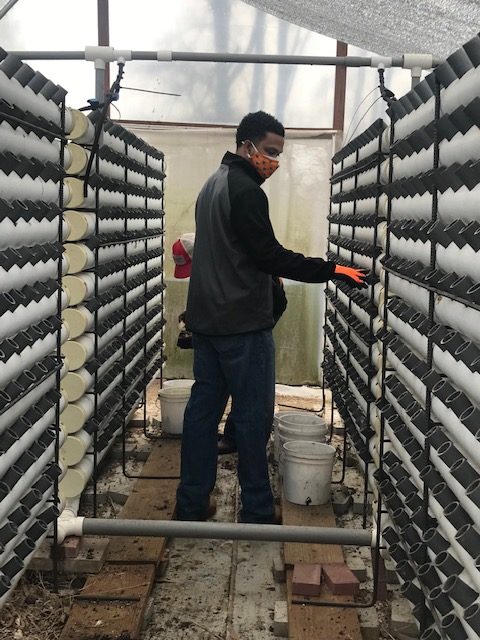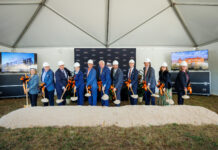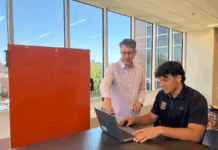ATLANTA — Mercer University College of Education’s AgSTEM partnership with a group of schools in Gwinnett County recently added another collaborator in Grace Hope Church that will further serve the goal of making strides in STEM education and have a profound difference in the lives of nearby community members.
The church is turning over management of its greenhouse, accompanying aquaponics system and education building — all valued at more than $120,000 — to Gwinnett County Public Schools’ (GCPS) Archer Cluster to support education and a farmer’s market that will assist local food banks and families in need. The Archer Cluster is a group of five schools feeding into and including Archer High School.
In addition, master gardeners from the University of Georgia’s Master Gardener Extension Volunteer Program will assist with managing the day-to-day operations of this site.
Individuals involved in the project from Mercer include Dr. Justin Ballenger, assistant professor of education and director of the STEM Education and Innovation (SEI) Lab, and Dr. Elaine Thurmond, assistant professor of clinical practice and assistant director of the SEI Lab.
Individuals involved in the project from the GCPS Archer Cluster and Gwinnett County community include STEM Curriculum Coach and second-grade teacher at Harbins Elementary Melissa Barth, K-5 STEM Content Specialist at Lovin Elementary Gerin Hennebaul, STEM Coordinator at Archer High Eric Stoker, Archer High Principal Ken Johnson, Gwinnett Soil and Water Conservation District Representative Tixie Fowler and Public Information Officer at Gwinnett County Sheriff’s Office Ashley Castiblanco.
Another important partner in this project is Grace New Hope Church, located in Lawrenceville. The church’s recent contribution of the greenhouse and aquaponics facility to the Archer Cluster has allowed the vision of hands-on STEM education to come to fruition.
“As a church, we feel like being part of serving the local needs of our community is central to what we seek to be,” said Grace New Hope Pastor Randy Rainwater. “From providing food to training young leaders, this seems like a win across the board.”

In order to reinvigorate and prepare for student use of the aquaponics system, a cleanup workday event was held Feb. 27 that was attended by many residents, including employees in the Archer Cluster. Tasks included cleaning planting pods and shoveling mulch.
“I work with a lot of clusters, and I was impressed with the number of educators that came out there,” Fowler said. “I think we got a lot done, and everyone worked hard, so it was very positive energy and fun.”
Representatives from the Gwinnett County Sheriff’s Office were also in attendance to provide gardening tools, community awareness of the event and hands-on support.
“We come with our boots on the ground running, ready to assist,” Castiblanco said. “Deputy James Wilson was able to help because he’s our master gardener. I think it’s a great thing that we’re able to help our community. That’s what’s big to us.”
The Archer Cluster also aspires to open a farmers market to be a tool alongside the greenhouse to support local food banks. The idea sprouted from another Gwinnett County school that executed its farmers market in an inspiring manner.
“We had always planned on having a farmers market, and last year a few teachers from Archer and I went to Brookwood High’s farmers market,” Stoker said. “We really liked that idea with the greenhouse, and we had a barn area and could build a stage on New Hope Road for the market. It just happened to be a perfect situation for us.”
Barth stressed the project’s focus on community service and the lessons that will be taught to the children about the community in which they reside.
“Whenever we grow, we really want to give back to the community and have them feel part of it and what we’re doing,” Barth said. “Opening that up to parents and the kids in our community and kids taking ownership saying, ‘Hey, I grew that,’ I think that’s a really important note, too.”
AgSTEM has been implemented in the Archer Cluster’s prospective hands-on learning curricula, particularly with various subjects at the high school level, like language arts and social studies.
“We’re setting an expectation for next year to have our core area teachers choose from their curriculum standards different things that can be taught through the lens of AgSTEM,” Johnson said. “It works great with the sciences, but the expectation is being set that other curriculum areas are going to get involved, as well.”
The project has allowed much flexibility in spite of COVID-19 restrictions, even for parents like Dr. Ballenger, who has virtual learners at home.
“It has been neat to see some of the ways that it’s been incorporated into the STEAM specials,” Dr. Ballenger said. “My children are taking pictures of what’s happening and making inferences about what should happen. It’s a neat application to the virtual environment.”
The project also has provided nutritional benefits to the community around the Archer Cluster.
“We’re located in a food desert area because the Dollar General doesn’t sell fruits and vegetables, and our families don’t always have access to things fresh grown,” Barth said. “In my classroom, we have a tower garden, and our tomatoes are finally growing. To see the smiles on my students’ faces — it’s a great connection to the community.”
Within the span of several years, the Archer Cluster has undergone changes that have allowed positive change in the community.
“It just makes me so happy to think about where we were four years ago and where we are now,” Hennebaul said. “It just makes me more excited about where we’re going to be in another four years.”
Through inspiration and influence, Mercer has also felt the impact of this project within its various classrooms and its students’ potential career pathways post-graduation.
“As an assistant professor at Mercer, I get to share all of these experiences with students in my STEM and social studies classes, and they can make the connection as real-world lessons in their own classroom,” Dr. Thurmond said. “Students need to have this kind of background knowledge to be able to make the transition into any learning environment because they never know what school they may end up in.”
The project shows promise of profound community impact through educational and nutritional means.
“Community service is a big focus in the Archer Cluster,” Hennebaul said. “And we’re pretty proud of that.”










